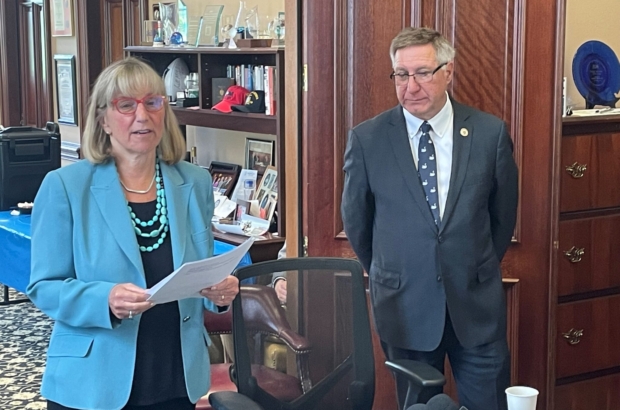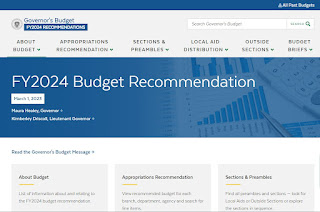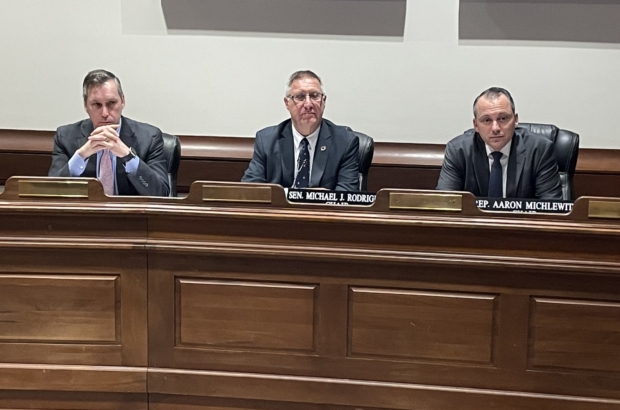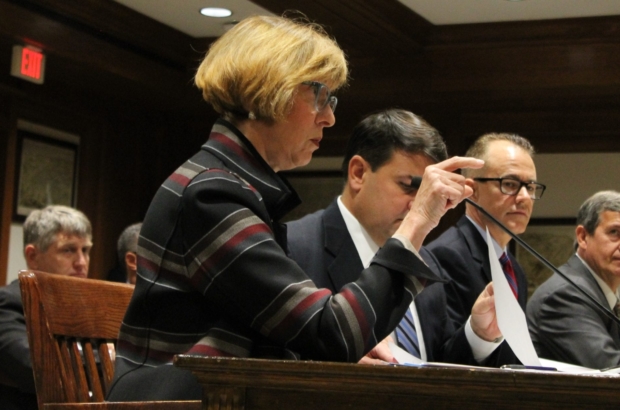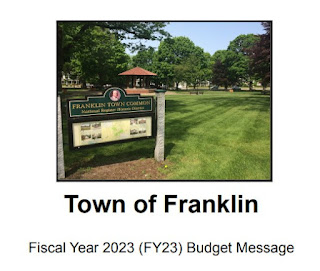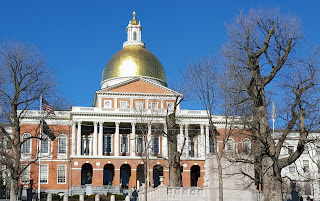Governor Charlie Baker today (7/28/22) signed the Fiscal Year 2023 (FY23) budget, a $52.7 billion spending plan that supports the Commonwealth’s communities, families, businesses, and workers. The budget fully funds the continued implementation of the Student Opportunity Act, while expanding proven programs and making record investments in early education and childcare, housing and homeownership, college financial aid, economic and workforce development, behavioral health care and local aid.
The FY23 budget is in balance, does not rely on one-time revenue sources, and does not raise any new taxes or fees; rather, it incorporates $315 million to support permanent tax reductions that are expected to be enacted through separate legislation pending in the Legislature. Several of the expected tax measures were first proposed in the Administration’s FY23 budget plan filed in January, including an increase to the rental deduction cap, expansions of the dependent care and senior circuit breaker tax credits, and estate tax reforms.
“With the Commonwealth in a historically strong fiscal position, the FY23 budget supports tax relief for hundreds of thousands of taxpayers, while making record investments in education and local aid,” said Governor Charlie Baker. “Since coming into office, our Administration has worked closely with the Legislature to ensure the budget is structurally sound and protected from unpredictable economic fluctuations, and I am pleased to sign another budget that maintains this commitment while making investments help Massachusetts’ families and communities grow and thrive.”
“The FY23 budget maintains our Administration’s strong support for the Commonwealth’s cities and towns and expands services in acute areas of need, like housing stability, education and childcare access, workforce development, transportation, substance addiction treatment and behavioral health care,” said Lieutenant Governor Karyn Polito. “This funding will further our work to encourage the economic growth of our communities, promote equitable access to opportunity and support the health and wellbeing of all residents.”
The FY23 budget incorporates an upgraded $39.576 billion base tax revenue forecast, an increase of $2.66 billion above the total FY23 consensus tax projection set in January. This revenue supports a total of $52.7 billion in gross spending, excluding the Medical Assistance Trust Fund transfer, which reflects approximately 9.3% growth in appropriations over Fiscal Year 2022 (FY22).
As enacted, the budget anticipates a sizable deposit into the Stabilization Fund of nearly $1.5 billion, which would increase the balance of the Fund from an already historic high of $6.9 billion to $8.4 billion. This would represent a $7.3 billion increase in the balance of the Stabilization Fund since the Baker-Polito Administration came into office in 2015 – an achievement made possible by the Administration and Legislature’s close collaboration and commitment to responsible management of the Commonwealth’s finances.
“Fiscal responsibility has been a cornerstone of the Baker-Polito Administration, and we are proud of the work that has been done over the last seven years to bring the budget into structural balance and build up reserves, which will protect the Commonwealth from economic volatility and ensure the continuity of vital government services in the long-term,” said Administration and Finance Secretary Michael J. Heffernan. “We thank our colleagues in the Legislature for their partnership in developing this impactful spending plan that sustains critical supports for the Commonwealth’s communities, families, and workers.”
The revenue upgrade incorporated into the budget also affords a number of substantial one-time transfers and reserves in FY23, including: a $266 million reserve to support MBTA safety and workforce initiatives; a $175 million transfer to a new trust fund dedicated to supporting high-quality early education and care; a $150 million transfer to the Student Opportunity Act Investment Fund; $100 million for a supplemental transfer to the Commonwealth’s Pension Liability Fund; and $100 million for a transfer to the State Retiree Benefits Trust Fund.
Investing in Massachusetts’ Future
The FY23 budget makes record investments in the Massachusetts education system across all levels, from childcare to higher education. It continues to fully fund the implementation of the Student Opportunity Act with a $5.998 billion annual Chapter 70 investment, along with a $67.7 million increase over FY22 for special education circuit breaker reimbursement for cities and towns and a $89.2 million increase in charter school reimbursement funding. The Governor also signed a new one-time investment of $110 million that will support a pilot free school meal program for students in K-12 schools.
In addition to the $175 million trust fund transfer to support high-quality early education and care, the FY23 budget provides a total of $1.184 billion for the Department of Early Education and Care (EEC). Notably, this includes $250 million for grants to help stabilize early education and childcare providers through the pandemic recovery period, $60 million for childcare provider rate increases and funding to support the full implementation of a more equitable parent fee scale that will result in virtually all subsidized families paying a fee that is 7% of their income or less in FY23.
The FY23 budget also provides $1.61 billion for college affordability, degree completion, and workforce readiness. This funding supports more than $190 million in support for financial aid, which includes an expansion of the MASSGrant Plus program that will enable all low-income, in-state undergraduate students to attend public higher education without incurring debt for mandatory tuition and mandatory fees. The budget also includes over $30 million to scale up college and career pathway programs for high school students with a focus on equity and recruitment of high-need student populations.
The budget furthers supports job readiness and efforts to connect students and workers to high-demand career pathways with increased funding for programs within the Executive Office for Labor and Workforce Development (EOLWD). It includes $28.5 million for the YouthWorks Summer Jobs program, $23.9 million in total funding for the Career Technical Initiative, $17 million for the Workforce Competitiveness Trust Fund, and $15 million for MassHire one-stop career centers.
As Massachusetts’ economic recovery continues, the budget supports the Baker-Polito Administration’s focus on promoting equitable growth and opportunity for communities and businesses across the Commonwealth. The budget provides $32.2 million for the Small Business Technical Assistance Grant Program, which supports diverse entrepreneurs and small businesses, along with $20 million for the Community Empowerment and Reinvestment Grant program, $17.2 million for local economic development projects, and $10.7 million to support Massachusetts tourism and hospitality.
The FY23 budget builds on the Administration’s efforts to promote equality and opportunity for communities of color with more than $50 million across the budget supporting targeted programs and initiatives aligned with the recommendations of the Governor’s Black Advisory Commission (BAC) and Latino Advisory Commission (LAC). The budget also fully funds the Supplier Diversity Office (SDO), which promotes diversity, equity, and inclusion in state contracting and ensures accountability and compliance with diversity goals.
To continue supporting local communities throughout Massachusetts, the FY23 budget increases the Unrestricted General Government Aid (UGGA) investment by $63.1 million above FY22, for a total of $1.231 billion. A further $20.7 million in funding is provided for Community Compact-related programs including best practices and regionalization and efficiency grants.
Recognizing the challenges of the housing market, particularly in the aftermath of COVID-19, the FY23 budget makes investments to create long-lasting improvements in housing stability and access to homeownership. Building on the Eviction Diversion Initiative (EDI), the budget implements major reforms and significantly increases funding for rental assistance, re-housing benefits and housing vouchers. Along with eligibility expansions that will multiply the number of households served and increase benefits, the budget invests a historic $150 million in Residential Assistance for Families in Transition (RAFT), an increase of $128 million (582%) above FY22, and it provides $59.4 million for HomeBASE, a 129% increase vs. FY22. It also supports $110 million for homeless individual shelters, a 90% increase above FY22, and $154.3 million for Massachusetts Rental Voucher Program (MRVP), which will support enhanced benefits and reforms that will give families more housing choice and flexibility.
The budget sustains support for core health care programs and makes investments to expand services for the most vulnerable, while improving access to health care for all residents. Within the $19.480 billion gross / $7.301 billion net MassHealth budget, $115 million will fund nursing facility staffing rate increases and supplemental payments. The MassHealth budget also incorporates a gross increase of $73.2 million to expand the Medicare Savings Program, which will reduce out-of-pocket health care spending and prescription drug costs for approximately 65,000 low-income seniors and disabled individuals.
The MassHealth budget includes $115 million to support the expansion of outpatient and urgent behavioral health services; further FY23 investments in behavioral health care include $20 million for a clinical behavioral health worker loan forgiveness program and a $20 million for a trust dedicated to supporting the expansion of access to and utilization of behavioral health services.
The COVID-19 pandemic exacerbated substance addiction issues across Massachusetts, and the FY23 budget continues to ramp up funding to combat this public health crisis. The budget includes $597.2 million in total funding for a wide range of harm reduction, treatment, and recovery programs that support individuals struggling with substance addiction and programs that work to prevent substance addiction through education, prescription monitoring, and more.
The budget also continues efforts to ensure survivors of sexual assault and domestic violence have access to necessary services and supports, a priority of the Baker-Polito Administration. $132 million in total FY23 funding is allocated for services to prevent and treat sexual assault and domestic violence, a 104% increase in funding since FY15.
Outside Sections and Earmarks
As part of the budget-signing, Governor Baker vetoed $475,000 in gross spending, signed 153 outside sections, and returned 41 to the Legislature with proposed amendments.
Notable outside sections returned with amendment include:
- Adding the most important provisions from the Administration’s dangerousness bill into the section that would provide free phone calls to inmates.
- Amending an outside section relating to the Children and Family Legal Representation Trust Fund to require that money in the fund may only be spent on expanded guardian ad litem appointments in care and protection cases
- Requiring the Health Connector to study implementation steps and costs of a Connector Care pilot program
FY23 Budget Highlights:
K-12 Education
- Fully funds the implementation of the landmark Student Opportunity Act, adding a total of $651.8 million in new spending above FY22:
- $494.9 million increase in Chapter 70 funding, including an increase in minimum per-pupil aid from $30 to $60, for a total Chapter 70 investment of $5.998 billion
- $67.7 million increase for special education circuit breaker reimbursement for local cities and towns
- $89.2 million in additional funding for charter school reimbursement
- $150 million for a one-time transfer to the Student Opportunity Act investment trust fund
- $110 million for a pilot free school meal program for students in K-12 schools
- Over $30 million to scale up college and career pathways
- $15 million for scholarships and loan forgiveness programs for public school teachers
Early Education and Childcare- $1.184 billion for Early Education and Care (EEC), including:
- $250 million to support continued stabilization of childcare facilities
- $60 million for center-based childcare provider rate increases
- In addition to the above funding, a one-time $175 million transfer to a new trust fund dedicated to supporting high-quality early education and care
Higher Education
$1.61 billion for the Department of Higher Education, University of Massachusetts, and state universities and community colleges, including:- More than $190 million to support financial aid, including $18 million to support an expansion of the MASSGrant Plus program that will enable all low-income, in-state undergraduate students to attend public higher education without incurring debt for mandatory tuition and mandatory fees and $15 million for financial aid increases at the University of Massachusetts
- $22 million in financial aid for Massachusetts students attending private institutions
- $8.8 million for foster care financial aid and fee waiver programs to maintain support for over 1,400 students attending private and public campuses who are currently or were previously in DCF custody and care, or who have been adopted through DCF
Supporting Local Government
Total investment of $1.231 billion in Unrestricted General Government Aid (UGGA) for local cities and towns
- $20.7 million for Community Compact related programs including best practices and regionalization and efficiency grants, an increase of 63% above FY22, including $5 million for the Public Safety Staffing Grant Program and $3 million for district local technical assistance
Housing and Homelessness
$884.6 million for the Department of Housing and Community Development, a $300.5 million (51%) increase above FY22, which includes:
- $219.4 million for the Emergency Assistance family shelter system
- $154.3 million for MRVP to support more than 10,000 vouchers in FY23
- $150 million for Residential Assistance for Families in Transition (RAFT), an increase of $128 million above FY22
- $110 million for Homeless Individual Shelters and $5 million to continue an innovative model to create new housing opportunities with wraparound services for chronically homeless individuals
- $92 million in funding for Local Housing Authorities
- $59.4 million for HomeBASE Household Assistance
- $12.5 million for a collaborative program through which the Department of Mental Health provides mental health services and DHCD provides rental assistance
Economic Development
- $32.2 million for the Small Business Technical Assistance Grant Program for entrepreneurs and small businesses, especially those owned by women, immigrants, veterans, and people of color
- $20 million for the Community Empowerment and Reinvestment Grant program to support development in socially and economically disadvantaged communities
- $10.7 million to support the Massachusetts tourism and hospitality sector
Labor and Workforce Development
- $28.5 million for the YouthWorks Summer Jobs Program to subsidize summer job opportunities and provide soft job skills education for youths
- $23.9 million in total funding for Career Technical Institutes, which provide pathways to high-demand vocational trade careers, including plumbing, HVAC, manufacturing, and robotics
- $15 million for MassHire one-stop career centers
- $600,000 for a new appropriation to expand research and analytics capabilities to enhance data-driven workforce development strategies
Health and Human Services
- $230 million for Chapter 257 human service provider funding
- $115 million to expand outpatient and urgent behavioral health services at MassHealth, plus an additional $20 million at the Department of Mental Health for clinical behavioral health worker loan forgiveness
- $73.2 million gross to expand the Medicare Savings Program, reducing out-of-pocket health care spending and drug costs for approximately 65,000 low-income older adults and disabled individuals
- $720.4 million for the Executive Office of Elder Affairs, including $24.9 million for grants to Local Councils on Aging, $7.9 million for supportive senior housing, and $2.5 million for geriatric mental health services
- Fully funds the Turning 22 program at the Department of Development Services and other agencies
- $1.2 billion for the Department of Children and Families (DCF), an increase of $368.7 million (45%) since 2015, including $13.4 million to support families that are fostering children in DCF care and to encourage recruitment of new foster families
- $174.2 million in funding for Veterans’ Services and the Chelsea and Holyoke Soldiers’ Homes, which includes a $13.2 million (37%) increase above FY22 for the Chelsea Soldiers’ Home to support the Fall 2022 opening of a new 154-bed state-of-the-art Community Living Center
- $15 million in grants to local health departments to support municipalities' capacity to respond to the COVID-19 pandemic
Substance Addiction Prevention and Treatment
- $597.2 million for substance addiction prevention and treatment services across the budget, an increase of $478 million since FY15
Sexual Assault and Domestic Violence
- $132 million, a 104% increase since FY15, in support of services to prevent and treat victims of sexual assault and domestic violence, including $1.5 million in new investments to combat human trafficking
Promoting Equality and Opportunity
- More than $50 million supporting the recommendations of the Black Advisory Commission (BAC) and the Latino Advisory Commission (LAC)
Transportation
- $1.55 billion in total budget transfers for the MBTA
- $457 million for the Massachusetts Department of Transportation (MassDOT), including $95 million for snow and ice operations and $3.4 million to support implementation of new funds provided through the Infrastructure Investment and Jobs Act
- $266 million for a reserve to support MBTA safety improvements and workforce initiatives
- $96.5 million for Regional Transit Authorities
- $11.6 million for the Merit Rating Board
Energy and the Environment
- $134 million for the Department of Conservation and Recreation, including funding for the Summer Nights program and the Swim Safe Massachusetts program to enhance and promote water safety
- $45.4 million for Environmental Protection Administration
- $30.6 million for the Massachusetts Emergency Food Assistance Program
- $5.4 million for climate change and adaptation preparedness
Criminal Justice and Public Safety
- $445.1 million for the State police public safety and crime lab operations, including funding to support the 87th and 88th Massachusetts State Police Recruit Training Troops
- $12.3 million in funding for the Shannon Grant program to fund anti-gang and youth violence prevention efforts
- $10.4 million to fully fund tuition and fee waivers for National Guard members
- $11.7 million for the Municipal Police Training Commission to implement bridge academies, expand training capacity, and annualize training requirements such as de-escalation and school resource officer trainings
- $5.8 million to support the Peace Officer Standards and Training (POST) Commission and four other new commissions created in the Police Reform bill
- Eliminates all parole and probation fees, building upon the 2018 Criminal Justice Reform legislation which eliminated fees for parolees on supervision for less than a year
Securing and Modernizing Government IT
$163.3 million for the Executive Office of Technology Services and Security to support:
- Management of Cyber Security Operations Center (SOC)
- Continued migration of applications and infrastructure to cloud, third-party on-premise, and Software as a Service (SaaS)
- Continuation of EOTSS customer engagement initiative to enhance IT and security service offerings across Commonwealth agencies
- IT strategy consulting services in support of priority state agency and cross-secretariat initiatives
- Business intelligence (BI) and data analytics support for state agencies
- Centralized software and IT contract compliance program
To view the FY23 budget, click here
Video of the Governor's press conference when he signed the legislation including the follow-up questions from the press present https://youtu.be/l_81lhjV3zE
